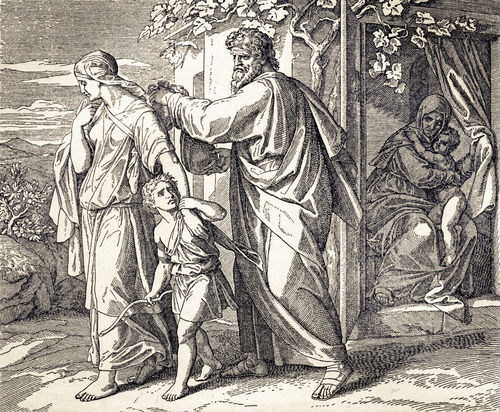Never Ending Faithfulness – Psalm 119:89-91 – June 23 2021
/0 Comments/in Enduring Words for Troubled Times/by David GuzikHow to Ask God for Help – Isaiah 64:8-9 – June 22 2021
/0 Comments/in Enduring Words for Troubled Times/by David GuzikRejecting God’s Altar – 2 Kings 16:10-11 – June 21 2021
/0 Comments/in Enduring Words for Troubled Times/by David GuzikRevival Is Like Judgment Day
/0 Comments/in Weekly Devotional/by David GuzikThen Ananias, hearing these words, fell down and breathed his last. So great fear came upon all those who heard these things. And the young men arose and wrapped him up, carried him out, and buried him. (Acts 5:5-6)
A man named Ananias, along with his wife, lied to God and cheated the church. They did it to appear more generous and spiritual than they really were.
Shockingly, God brought swift judgment: Then Ananias, hearing these words, fell down and breathed his last. Peter did not pronounce a death sentence on Ananias. It isn’t the business of the church to pronounce a death sentence on anyone. Peter simply confronted him with his sin and Ananias fell down dead, and he was probably more surprised than anyone else when Ananias fell down dead.

This was a harsh penalty for a sin that seems common today. Some wonder if God was too harsh against, but maybe the greater wonder is that God delays His righteous judgment in almost all other cases. Ananias received exactly what he deserved; he simply could not live in the atmosphere of purity that marked the church at that time.
This judgment on Ananias must be seen in the context of its time. This was a critical stage for the early church and such impurity, sin, scandal, and satanic infiltration could have corrupted the entire church at its root. Then, the church was all “root” – the branches had not yet developed. We can guess that one reason we don’t see God’s judgment just like this today is because God’s church has so many branches. Even if the entire body of Christ in the United States was to become corrupt through scandal or sin, there is plenty of strength in other parts of the tree around the world.
What God did here in Acts 5 shows it is wrong to assume that there is always more time to repent, more time to get right with God, more time to get honest with Him. Any such time given by God is an undeserved gift that He owes no one; we should never assume it will always be there.
There was an immediate result: So great fear came upon all those who heard these things. God’s purpose was accomplished in the church as a whole. This was evidence of a great work of God among His people.
When God begins to move in a mighty way among His people, it often starts with the exposure of sin, leading to radical repentance. God wouldn’t allow for a cover-up; this was going to be exposed so God’s people would take sin seriously.
We often think revival is something triumphant, moving from glory to glory. True revival from God is glorious, but often begins as judgment day for the church. But after the judgment, and after things are settled, real blessing flows.
If God is “cleaning house” in your church or life, don’t despise it. It could be the start of the revival you’ve been praying for.
View or listen to the late Dr. J. Edwin Orr’s wonderful message, “Revival Is Like Judgement Day”
Satanás y mi pecado
/0 Comments/in Devocional Semanal/by David GuzikY dijo Pedro: Ananías, ¿por qué llenó Satanás tu corazón para que mintieses al Espíritu Santo, y sustrajeses del precio de la heredad? Reteniéndola, ¿no se te quedaba a ti? y vendida, ¿no estaba en tu poder? ¿Por qué pusiste esto en tu corazón? No has mentido a los hombres, sino a Dios (Hechos 5:3-4).
Cuando pecamos, ¿de quién es la culpa? A veces nos gusta afirmar que el diablo nos hace pecar. No quiero defender al diablo, ¡pero Satanás no hace todo de lo que se le culpa! La verdad es que el mundo, la carne y el diablo trabajan juntos para llevarnos al pecado y la ruina. Hechos 5 es un ejemplo de esto.

En una época de gran generosidad entre los primeros cristianos, un hombre llamado Ananías y su esposa Safira quisieron ser conocidos como personas súpergenerosas. Vendieron una heredad. Luego, fingieron dar todo el dinero de la venta a la iglesia, pero en realidad se quedaron con parte del dinero para ellos.
Este fue un pecado lamentablemente innecesario. Pedro le dijo a Ananías, reteniéndola, ¿no se te quedaba a ti? y vendida, ¿no estaba en tu poder? Pedro comprendía que la tierra y su valor realmente pertenecían a Ananías; era completamente libre de hacer con ella lo que quisiera. Su crimen no era retener el dinero, sino dar a entender engañosamente que lo dio todo.
Este fue un pecado tan grave que Pedro tuvo que confrontar públicamente a Ananías. Cuando Pedro habló, Ananías debe haberse sentido destrozado. Ciertamente, esperaba elogios por su espectacular regalo, pero en cambio fue reprendido. Pedro vio que Satanás estaba obrando, incluso a través de un hombre como Ananías, que se contaba entre los creyentes.
No hay duda de que Satanás hizo su obra en el corazón de Ananías. Pero Pedro también describió su pecado de otra manera: ¿Por qué pusiste esto en tu corazón? Satanás había llenado el corazón de Ananías, sin embargo, Pedro pudo preguntarle por qué había puesto esto en tu corazón. Satanás puede influir en la vida de un creyente, incluso en un creyente lleno del Espíritu, pero no puede pecar por uno. Ananías tuvo que ponerlo en su corazón.
Necesitamos practicar la guerra espiritual, sabiendo que nuestros verdaderos enemigos son espirituales (Efesios 6: 10-20). Debemos estar en guardia contra Satanás y todas sus estrategias.
Sin embargo, si usted es un creyente, recuerde – Satanás no puede hacerlo pecar. Él puede tentarlo, gritarle, intentar engañarlo o asustarlo, pero el diablo no puede pecar por usted.
Así que, mientras está usted en guardia contra Satanás y sus estrategias, también asegúrese de tener doble cuidado de mantener un corazón abierto ante Dios. Cuide lo que pone en su corazón. No tenga miedo de confesar su corazón. Someteos, pues, a Dios; resistid al diablo, y huirá de vosotros (Santiago 4: 7).
The God Who Sees
/0 Comments/in For Pastors, Preachers, Bible Teachers/by David GuzikDear Pastor, Preacher, or Bible Teacher –
Do you remember the story of Hagar? We often don’t dwell too long on her as we read and teach through Genesis. However, consider this from Genesis 16:13:
Then she called the name of the LORD who spoke to her,
You-Are-the-God-Who-Sees; for she said,
“Have I also here seen Him who sees me?”
In a terrible home situation, all Hagar could do was run. Hagar thought her circumstances needed transformation; in fact, she needed transformation. The God of transforming power met her at a well. There she came realize that she met with Him who sees me.

Dear brother, sister, co-laborer in God’s work: God sees you. He is with you. No matter how discouraging, troubling, or difficult your situation is right now, please know that even as God saw and helped Hagar, God sees and will help you.
In Jesus Christ, we have an even more clear and wonderful promise of this than Hagar had. We have the promise of Jesus: Behold, I am with you always, even unto the end of the age (Matthew 28:20).
- If you must submit in difficult circumstances, God sees.
- If you ache under the pain of ministry, God sees.
- If you just feel like running, God sees.
- God has met you, sent Jesus near, and gives you new hope.
El Roi – the God Who Sees – is with you today.
Blessings to you in Jesus’ Name – David Guzik
Click Here to Receive Email from David for Pastors, Preachers, and Bible Teachers





